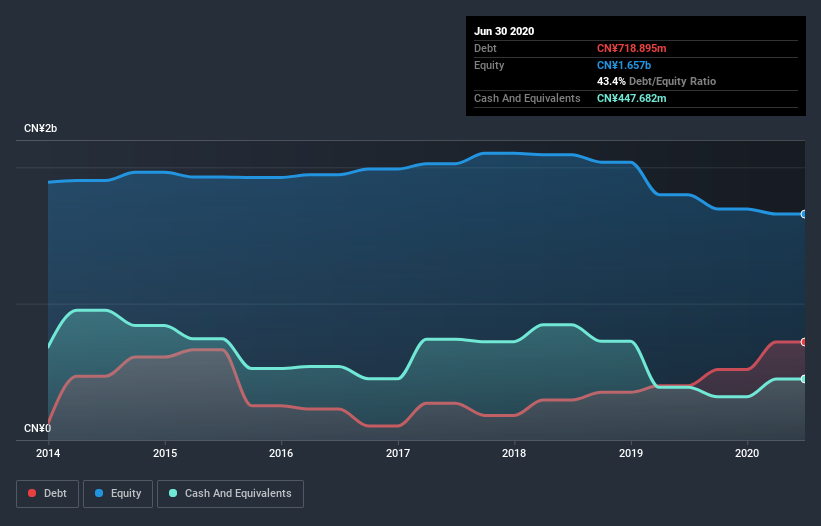These 4 Measures Indicate That Tenfu (Cayman) Holdings (HKG:6868) Is Using Debt Reasonably Well

The external fund manager backed by Berkshire Hathaway's Charlie Munger, Li Lu, makes no bones about it when he says 'The biggest investment risk is not the volatility of prices, but whether you will suffer a permanent loss of capital.' When we think about how risky a company is, we always like to look at its use of debt, since debt overload can lead to ruin. Importantly, Tenfu (Cayman) Holdings Company Limited (HKG:6868) does carry debt. But the more important question is: how much risk is that debt creating?
What Risk Does Debt Bring?
Debt and other liabilities become risky for a business when it cannot easily fulfill those obligations, either with free cash flow or by raising capital at an attractive price. If things get really bad, the lenders can take control of the business. However, a more common (but still painful) scenario is that it has to raise new equity capital at a low price, thus permanently diluting shareholders. Of course, debt can be an important tool in businesses, particularly capital heavy businesses. When we think about a company's use of debt, we first look at cash and debt together.
Check out our latest analysis for Tenfu (Cayman) Holdings
What Is Tenfu (Cayman) Holdings's Net Debt?
You can click the graphic below for the historical numbers, but it shows that as of June 2020 Tenfu (Cayman) Holdings had CN¥718.9m of debt, an increase on CN¥397.1m, over one year. However, because it has a cash reserve of CN¥447.7m, its net debt is less, at about CN¥271.2m.

How Strong Is Tenfu (Cayman) Holdings's Balance Sheet?
Zooming in on the latest balance sheet data, we can see that Tenfu (Cayman) Holdings had liabilities of CN¥1.12b due within 12 months and liabilities of CN¥162.0m due beyond that. Offsetting these obligations, it had cash of CN¥447.7m as well as receivables valued at CN¥252.1m due within 12 months. So its liabilities outweigh the sum of its cash and (near-term) receivables by CN¥581.8m.
Of course, Tenfu (Cayman) Holdings has a market capitalization of CN¥5.38b, so these liabilities are probably manageable. However, we do think it is worth keeping an eye on its balance sheet strength, as it may change over time.
In order to size up a company's debt relative to its earnings, we calculate its net debt divided by its earnings before interest, tax, depreciation, and amortization (EBITDA) and its earnings before interest and tax (EBIT) divided by its interest expense (its interest cover). Thus we consider debt relative to earnings both with and without depreciation and amortization expenses.
Tenfu (Cayman) Holdings has a low net debt to EBITDA ratio of only 0.54. And its EBIT covers its interest expense a whopping 16.7 times over. So we're pretty relaxed about its super-conservative use of debt. Also good is that Tenfu (Cayman) Holdings grew its EBIT at 12% over the last year, further increasing its ability to manage debt. When analysing debt levels, the balance sheet is the obvious place to start. But it is Tenfu (Cayman) Holdings's earnings that will influence how the balance sheet holds up in the future. So if you're keen to discover more about its earnings, it might be worth checking out this graph of its long term earnings trend.
Finally, while the tax-man may adore accounting profits, lenders only accept cold hard cash. So the logical step is to look at the proportion of that EBIT that is matched by actual free cash flow. During the last three years, Tenfu (Cayman) Holdings produced sturdy free cash flow equating to 56% of its EBIT, about what we'd expect. This cold hard cash means it can reduce its debt when it wants to.
Our View
Happily, Tenfu (Cayman) Holdings's impressive interest cover implies it has the upper hand on its debt. And the good news does not stop there, as its net debt to EBITDA also supports that impression! Looking at the bigger picture, we think Tenfu (Cayman) Holdings's use of debt seems quite reasonable and we're not concerned about it. After all, sensible leverage can boost returns on equity. When analysing debt levels, the balance sheet is the obvious place to start. But ultimately, every company can contain risks that exist outside of the balance sheet. For instance, we've identified 2 warning signs for Tenfu (Cayman) Holdings that you should be aware of.
At the end of the day, it's often better to focus on companies that are free from net debt. You can access our special list of such companies (all with a track record of profit growth). It's free.
If you’re looking to trade Tenfu (Cayman) Holdings, open an account with the lowest-cost* platform trusted by professionals, Interactive Brokers. Their clients from over 200 countries and territories trade stocks, options, futures, forex, bonds and funds worldwide from a single integrated account. Promoted
Valuation is complex, but we're here to simplify it.
Discover if Tenfu (Cayman) Holdings might be undervalued or overvalued with our detailed analysis, featuring fair value estimates, potential risks, dividends, insider trades, and its financial condition.
Access Free AnalysisThis article by Simply Wall St is general in nature. It does not constitute a recommendation to buy or sell any stock, and does not take account of your objectives, or your financial situation. We aim to bring you long-term focused analysis driven by fundamental data. Note that our analysis may not factor in the latest price-sensitive company announcements or qualitative material. Simply Wall St has no position in any stocks mentioned.
*Interactive Brokers Rated Lowest Cost Broker by StockBrokers.com Annual Online Review 2020
Have feedback on this article? Concerned about the content? Get in touch with us directly. Alternatively, email editorial-team@simplywallst.com.
About SEHK:6868
Tenfu (Cayman) Holdings
Operates as a traditional Chinese tea-product company.
Excellent balance sheet and fair value.


